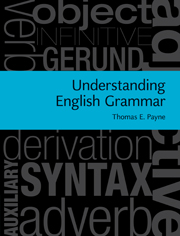Book contents
- Frontmatter
- Contents
- List of figures
- List of tables
- Preface
- Acknowledgements
- List of typographical conventions and abbreviations
- Introduction
- 1 History
- 2 Typology
- 3 The lexicon
- 4 Morphology – the shapes of words
- 5 Participant reference
- 6 Actions, states, and processes
- 7 Basic concepts in English syntax
- 8 Advanced concepts in English syntax
- 9 Complementation
- 10 Modification
- 11 Auxiliaries and the “black hole” of English syntax
- 12 Time and reality
- 13 Voice and valence
- 14 Clause combining
- 15 Pragmatic grounding and pragmatically marked constructions
- Glossary
- Endnotes
- References
- Index
8 - Advanced concepts in English syntax
Published online by Cambridge University Press: 05 June 2012
- Frontmatter
- Contents
- List of figures
- List of tables
- Preface
- Acknowledgements
- List of typographical conventions and abbreviations
- Introduction
- 1 History
- 2 Typology
- 3 The lexicon
- 4 Morphology – the shapes of words
- 5 Participant reference
- 6 Actions, states, and processes
- 7 Basic concepts in English syntax
- 8 Advanced concepts in English syntax
- 9 Complementation
- 10 Modification
- 11 Auxiliaries and the “black hole” of English syntax
- 12 Time and reality
- 13 Voice and valence
- 14 Clause combining
- 15 Pragmatic grounding and pragmatically marked constructions
- Glossary
- Endnotes
- References
- Index
Summary
Language exerts hidden power, like the moon on the tides.
Rita Mae BrownIn this chapter we will consider three hypotheses regarding the clause structure of English using the analytical methods and modeling techniques described in Chapter 7. Two of these hypotheses – the DP and IP hypotheses – represent recent proposals within the “Minimalist” tradition of Generative Grammar (Chomsky 1995, Radford 1997). These hypotheses provide helpful insights for the English language professional in that they highlight the importance of Determiners in the nominal system and Inflection in the verbal system. Determiners “anchor” noun phrases in pragmatic space while Inflection “anchors” verb phrases in time and reality (see Chapter 15). The third hypothesis – the GP hypothesis – while not central to an understanding of the overall syntactic character of English, is a logical consequence of the theoretical principles introduced in Chapter 7, and is helpful in understanding the meaning and use of genitive noun phrases.
The DP hypothesis
To this point we have been using the terms NP and DP without giving much evidence for why it is necessary to posit these two distinct phrasal categories, or how to tell one from the other. In this section I would like to provide evidence, using the tests for constituency described in Chapter 7, to show that DP is in fact an important phrasal category in English grammar. These facts are important to English language professionals for a couple of reasons.
Information
- Type
- Chapter
- Information
- Understanding English GrammarA Linguistic Introduction, pp. 186 - 204Publisher: Cambridge University PressPrint publication year: 2010
